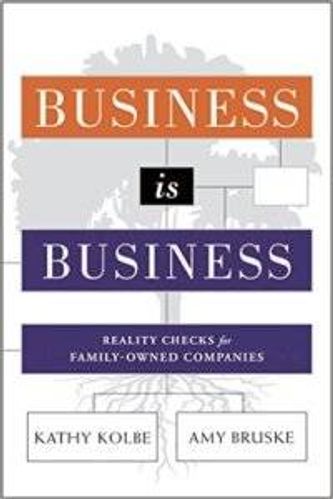How Family Businesses Can Set Work/Family Boundaries
The authors of 'Business Is Business' offer some reality checks
(This article is excerpted from the new book, Business Is Business: Reality Checks for Family-Owned Companies by Kathy Kolbe and Amy Bruske.)
If you and your family are in a family business, setting work-related boundaries is as important as putting a fence around a swimming pool. Without them, family members can dive into the business, get in over their heads and drown.
When setting boundaries, you need to draw a line between what’s acceptable and unacceptable. Then, you should state these boundaries clearly, note them often, adhere to them (even when you wish they weren’t there) and change them when they become too rigid.
The most fundamental boundary is to keep business matters at the office and to keep family matters at home. We’ve seen many situations where family members bring their personal issues into the workplace. That’s not only awkward for other employees; it is unhealthy for the relationship and completely unproductive for the business.
The 1 Family Business Boundary Never to Cross
There’s one boundary never to cross: Don’t bring work relationships home. You may be an expert in financial matters at work, but that doesn’t automatically mean you get to decide how to spend the family budget.
Even if you are their boss at work, do not tell fellow family members:
“We need you to come back rested from your vacation, so don’t do too much partying.”
“Here’s some reading it would be good for you to do over the weekend.”
“I don’t want you representing us until you lose weight.”
“The places you are going on dates are certainly not places where I’d like our clients to run into you.”
Family members have many fewer boundaries about sharing things than do other co-workers. It is easier for them to share a desk, a client or the plans for a company partner than it may be to do the same with non-family members. But this reliance on one another may be viewed as favoritism by non-family members in the business. For that reason, pay attention to the following policies and procedures regarding workspace for family members:
- Make a policy to distribute family member workspaces so they don’t cluster together.
- Don’t give them higher status locations than their jobs would normally merit.
- Don’t give them power over the design of the office unless they are senior enough in the organization to merit that level of decision making.
Be aware, too, of how you handle criticism of family members in front of non-family members. While it’s fine to have a heated discussion on a difference of opinion, it’s not okay to criticize a family member openly, especially when familiarity causes you to critique him or her in ways that you would never do with a non-family member.
Working With Spouses and Siblings
Finally, we’d like to offer guidance regarding working with your spouse or siblings.
Husbands and wives usually have different roles in the family; often, these roles follow the cultural sexism that has the husband serving as the strategist and the wife serving as the bookkeeper and office organizer. When those roles don’t fit their work roles, trying to fill them can lead to personal and professional stress.

Every couple needs to figure out what works best for them. If that breaks stereotypes, so be it. Celebrate the freedom you give each other to be who you are.
Even siblings who dearly love one another can have trouble working together because Dad used to praise one and not the other. Or Mom gave the easy chores to “her favorite.” And siblings know what buttons to push to get the reactions they want. Regrettably, that behavior in a workplace setting can destroy relationships.
It’s not unlike the boundaries for spouses; siblings are responsible to keep their personal baggage out of the workplace. “Staying in your lane” helps make this possible. Setting boundaries around separation of duties becomes even more important when siblings have significant differences in their approaches to problem solving.
Reality Checks: Family Business Questions to Ask Yourself
- Is there a clear delineation or definition of roles and responsibilities for each family member in the family-owned business?
- Have you ever let a family issue affect your business relationship with a family member?
- Are you trying to solve business problems at home?
- Are family members’ workspaces clustered together?
- Have there been situations in which something that should have stayed backstage occurred in front of the curtain?
https://www.youtube.com/watch?v=8tZNDueT4ik

